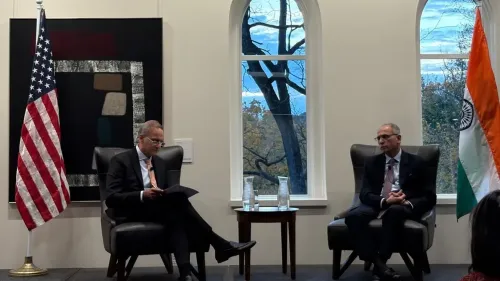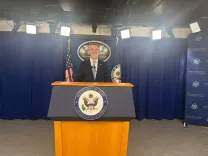Is the Suspension of the Water Treaty a Message to Pakistan about Terrorism Costs?

Synopsis
Key Takeaways
- Indus Waters Treaty suspended as a political strategy.
- Suspension aims to increase costs of terrorism for Pakistan.
- Military action taken against nine specific terror targets.
- Shift in India-Pakistan relations towards a new normal.
- Psychological messaging is crucial in the current context.
New Delhi, May 11 (NationPress) In light of the Pahalgam attack, the suspension of the Indus Waters Treaty served as a pivotal political statement from the Narendra Modi Government to Pakistan regarding the cost of terrorism, as noted by a high-ranking government official on Sunday.
Beyond the political angle, the leadership also considered military and psychological aspects in their response to the April 22 attack, which resulted in 26 civilian deaths.
Strategists within the Indian government believe that the message communicated through the treaty's suspension is one of elevating the costs of terrorism for Pakistan in an unprecedented manner.
“It is essential to understand why we decided to place the Indus Waters Treaty on hold, despite it having withstood three wars and a four-decade campaign of cross-border terrorism,” stated the official, who requested anonymity.
“Pakistan cannot expect to maintain cooperation in certain areas while simultaneously pursuing its campaign of cross-border terrorism elsewhere; there must be consequences. It has been made clear that blood and water cannot coexist,” the official explained.
While planning military actions post-Pahalgam, the government wanted to elevate their response beyond the retaliatory measures taken after previous terror incidents like Pulwama or Uri.
“Just like in the political realm, there was a need to enhance military responses and to demonstrate the extent to which the threshold had been crossed,” the official elaborated, explaining the precision targeting of nine terrorist assets within Pakistan and Pakistan-occupied Jammu and Kashmir.
Sources indicated that three locations—Bahawalpur, Muridke, and Bhutta—among the nine targeted sites are particularly significant due to the involvement of the Pakistani establishment.
“These facilities are crucial because they are closely connected to the Pakistani deep state,” the official remarked.
The military targets were significant as they were aimed at groups with a long history of operations in India, whether in Jammu and Kashmir or elsewhere, sending a clear message that India would strike back decisively, even at the heart of their operations.
Regarding the psychological aspect, the official noted that although escalation was not initially intended, the need arose to increase military costs for Pakistan after it attempted attacks at 26 locations on May 10.
“The Indian armed forces responded with what can only be described as hellfire,” the official added, emphasizing the realization among Pakistani forces that this would be a losing struggle.
All three vectors—political, military, and psychological—were designed to establish a new norm in India-Pakistan relations.
“This is no longer business as usual. A new normal has been established in our relationship, and both Pakistan and the world must adapt to this change,” the official concluded, suggesting that the psychological messaging from Operation Sindoor was intended for both Pakistan and the international community.









